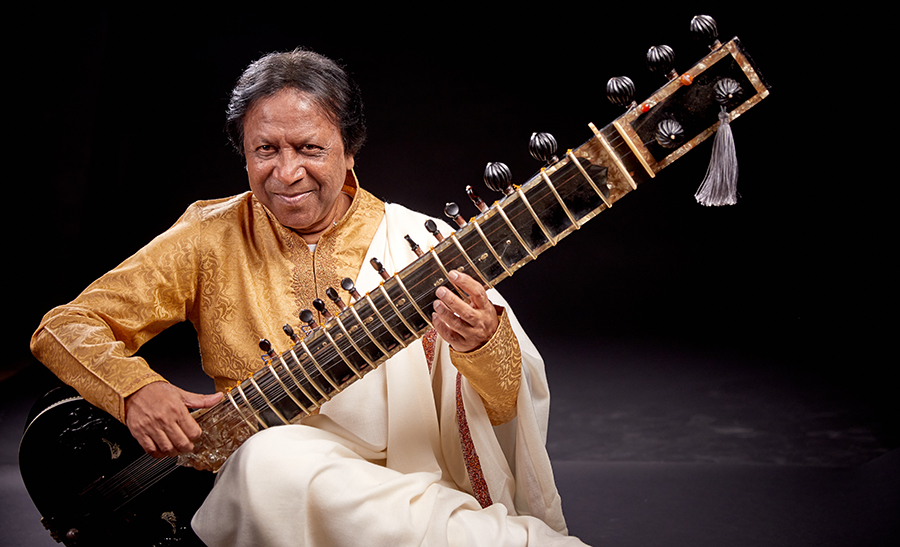
Wesleyan’s Navaratri celebrations kicked off on Sept. 28 and ended on Oct. 2. The series of events featured a musical performance by classical sitar player Ustad Shahid Parvez Khan on Oct. 1 at the Crowell Concert Hall. He was accompanied by Amit Kavthekar, a world-renowned tabla (hand drum) player.
Navaratri, one of India’s major festival celebrations, is a time to see family and friends, enjoy music and dance, and seek blessings for new endeavors. Wesleyan’s 46th annual Navaratri festival, as in years before, celebrated the incredible diversity of Indian music and culture.
Navaratri, Sanskrit for nine nights, is a period of time when Hindus all over the world celebrate the goddess Durga and her victory over the demon Mahishasura. Durga is looked to as the incarnation of all that is good, and hence her slaying of the demon Mahishasura symbolizes the inevitable victory of good over evil.
According to Hindu tradition, Mahishasura was blessed with the gift of immortality by Lord Brahma with the exception that only a woman could defeat him. Mahishasura soon grew arrogant, believing that no woman would ever come to face him, much less destroy him. He attacked Trilok (earth, heaven, and hell) and although the gods waged war on him, their efforts to defeat him were to no avail. To end his evil rampage, Lord Brahma (The Creator), Lord Vishnu (The Preserver), and Lord Shiva (The Destroyer), combined their powers and created the goddess Durga, who went on to kill Mahishasura. It is said that their battle raged on for nine nights, hence the name “nav-ratri” (nine nights).
Khan is considered one of the finest North Indian classical musicians of his generation. He represents the seventh generation of the Etawah Gharana, a musical tradition or ‘family’ committed to the most famous of Indian instruments—sitar. His style of playing the sitar, known as the “gayaki ang,” conveys the emotional directness and tonal nuance of the human voice through the instrument. Khan has been performing publicly since he was seven years old, having started his apprenticeship when he was only three. His performance this year was no less than astounding.
Khan and Kavthekar started the performance slow, with Khan strumming several different strings in order to set the tone. He slowly picked up pace, with his hands reaching impossible speeds, resulting in a crescendo that lasted anywhere between five and seven minutes every time he picked up the pace and slowed down. Kavthekar was no less impressive, using every square inch of his hands to produce impossible beats just by lightly tapping the membrane of the tabla he was playing.
The almost-packed concert hall was mesmerized by the complexities of the compositions being played by both these maestros, who made it seem like everyday work.
One thing that stood out was Khan’s body language and emotive bursts of energy when he reached his highest and fastest crescendos. Eyes closed, body vibrating, and his hands a blur, Khan played his sitar not as an instrument, but rather as an extension of his own body. To him, the sitar is as much a part of him as his hands and fingers. His control over and mastery of this incredibly complex instrument are proof enough.
The moment that most influenced me, however, was when Khan stopped his performance for a second and spoke to someone in the first row.
“Look how the times have changed,” Khan said in Hindi. (I am a Hindi speaker, and translated these comments.) “Earlier I used to go looking for the right notes; now these notes come to me.”
The simplicity and enormity of these lines sank right into my heart—having been a music student myself, I could judge how at peace Khan felt when practicing his art. More than the performance, it was this poet-like moment of his that brought a smile to my lips.
The concert was attended by Wesleyan’s music students and enthusiasts alike. One of them was Kaustabh Vasudevan ’26, who’s enrolled in the South Indian music class taught by Adjunct Professor of Music B. Balasubrahmaniyan.
“It was fascinating to hear the Ustad play his versions of traditional North Indian music so effortlessly,” Vasudevan said. “As someone who’s learned and been associated with South Indian music for almost five years now, the similarities and, at the same time, the uniqueness of North Indian music as compared to its southern counterpart was especially fascinating to observe.”
Another singing enthusiast is Suchita Sridhara ’26, who’s performed South Indian Carnatic music in and around the New England area since she was a child.
“The concert was one of the best I’ve been to in recent times!” Sridhara said. “As a singer, I could feel the tonal nuance of the human voice in the Ustad’s music, which was spellbinding. It felt as if the Ustad was accompanied by a pitch-perfect singer even though he was not.”
Overall, the performance was one to remember. The image of Khan’s humble yet towering persona, sitting cross-legged on the floor, strumming affectionately the strings of his chosen instrument, is one that will surely stick with anyone who attended the performance.
A true exhibition of Indian music and culture, the concert and the Navaratri celebrations gave the Wesleyan and greater Middletown community a glimpse into the incredible richness of the colorful fabric that is India.
Suryansh Dalmia can be reached at sdalmia@wesleyan.edu.


Leave a Reply